#[ character development ]
Text
Does your character use a legendary or iconic weapon? What is it? How reliant is your character on it?
86 notes
·
View notes
Text
Understanding Internal Conflict in Storytelling
Internal conflict is a vital tool in storytelling, enriching characters and deepening narrative impact. Understanding and effectively using internal conflict can transform a good story into a compelling, unforgettable one.
Introduction to Internal Conflict
Definition: Internal conflict refers to a psychological struggle within a character, often involving emotions, desires, or beliefs.
Purpose: It adds depth to characters, making them more relatable and complex.
Types of Internal Conflict
Moral Dilemmas: Situations where a character must choose between right and wrong, often with no clear answer.
Emotional Struggles: Conflicts arising from feelings like love, guilt, fear, or jealousy.
Identity Crises: Moments when characters question who they are or what they believe in.
Conflicting Desires: When a character's wants or needs are at odds with each other.
Examples of Internal Conflict
Classic Literature: Hamlet's indecision about avenging his father's death.
Modern Fiction: Katniss Everdeen's struggle between her survival instincts and her growing sense of rebellion in "The Hunger Games".
Film: Frodo Baggins grappling with the burden of the One Ring and its corrupting influence in "The Lord of the Rings".
Importance of Internal Conflict
Character Development: Drives growth and transformation, showing how characters evolve.
Engagement: Keeps readers invested in the character’s journey by creating empathy and tension.
Theme Exploration: Allows writers to explore complex themes like morality, identity, and human nature.
Crafting Internal Conflict
Believability: Ensure the conflict is realistic and relatable to the audience.
Depth: Give characters more than one internal conflict to make them richer and more interesting.
Resolution: Show how characters resolve or cope with their internal struggles, even if it’s not a happy ending.
Questions to Consider
What is the character’s main internal struggle?
How does this conflict affect their decisions and actions?
In what ways does the internal conflict drive the story forward?
#writing tips#writing advice#character development#writers on tumblr#writeblr#creative writing#fiction writing#writerscommunity#writing#writing help#writing resources
114 notes
·
View notes
Text
Prompt 2484
Base a story off of a dream you’ve had. If you don’t remember your dreams, base it off of a dream someone has told you about.
#daily writing prompts#fiction#writing#writing prompts#writing practice#writing inspiration#prompt#creative writing#character development#words
59 notes
·
View notes
Text
if your oc had the choice, would they go back in time?
66 notes
·
View notes
Text

When I’m writing chapter 1, but already thinking of the pain and suffering in chapter 15.
#ao3#fanfic#writing#writer stuff#writerscommunity#archive of our own#humor#writers on tumblr#ao3 writer#meme#angst#character development#writing memes#fan fiction writing
32 notes
·
View notes
Text
Another 5 Character Types the World Needs More of (Part 3)
Part 1
Part 2
I did not expect these two posts to continue getting notes. So. Here’s some that didn’t make the cut and a few new ones.
1. Character who is immune to everyone else’s bullshit
This can either be funny or a breath of fresh air. I’m talking your drama cast of 15 all losing their minds over “he said/she said” and fixating on so many ridiculous and arbitrary problems… meanwhile Chuck over here is skinned with teflon and completely immune to tropes like manufactured miscommunication or drama, who’s juuust shy of being genre savvy to Get Shit Done like this is their second time around the block and they are not happy to be back.
The first one to pop into my head is Soundwave from TFP. He has no voice actor for 99% of the show and doesn’t have a face and is only the focus character for like, 2 episodes, but whenever he’s on screen you can just see “I’m surrounded by idiots” playing on repeat in his head. This con is brutally efficient, never messes up, and is never wrong and while everyone else is caught up on ladder-climbing and revenge quests, Soundwave is over here vibing and keeping the whole cause together.
2. The Femme Fatale, but a man
This is not sexy suave abusive asshole hero you’re supposed to root for, who’s a male power fantasy. This is literally the exact same trope, but a man. Meaning, he gets the same revealing uniform, the same “I’m letting you think you’re in charge but really I’m pulling all the strings”. Crucially, he’s straight, because most of them are gay-coded (because the man being in the submissive, ‘girly role’ is horrifying, he must be gay). This dude weaponizes toxic masculinity, making the villains extremely uncomfortable and throwing the villain’s own power fantasy back in their face.
This dude unabashedly flirts with his captors just to get in their heads, removes all concepts of personal space, and makes straight villains seriously question their sexuality. He has social engineering down to a science. I’m sure there’s one that exists, but every one I can think of is already queer-coded and that’s not good enough. So just. Black Widow. But a man.
3. Mary Sue/ Gary Stu who becomes the villain
Since these characters are the product of insecurity and lack of self-awareness… the example for this trope is Titan from Megamind. This character is absolutely the hero of their own story, practically perfect in every way. They think they’re the best at everything without trying, flawless in features and personality, and everybody loves them. And genuinely, they are just that good.
So good, that they live long enough to become the villain. Obviously people who write Mary Sues with full sincerity have no idea that anything’s wrong or problematic, but a genuine Mary Sue whose perfection is their greatest flaw without them even realizing it would be an interesting villain because I’m getting sick and tired of “sympathetic” villains who are really starting to feel like excuses for abusers to be abusive because they were smacked around as a kid.
4. Paragon who is wrong, but also right?
Apparently I’m in a Transformers mood today. There’s an episode where the Autobots’ medic/second in command does the whole “desperate scientist tests their invention on themselves with horrible results” trope and he gains the strength and speed he otherwise hasn’t had in like, eons, and starts kicking ass and taking names (and committing war crimes) to the point where his team is like “uh, buddy, slow down a bit, you’re starting to act like a Decepticon”.
The best part of that episode is where Ratchet (medic) completely unloads on Optimus about how he’s too soft, about how he’s had a million chances to end the war and murder Megatron (which is true) and yet Optimus lets the window pass again and again still hoping for Megatron’s redemption… while in the process, countless Autobots keep dying, collateral keeps happening, all because Optimus is stubborn and won’t just get it over with.
We know Ratchet is right, because throughout the next season, Optimus is a bit more… shall we say, ruthless, in trying to legitimately end the war, Megatron’s redemption be damned. But that episode ends with Ratchet nearly dying when trying to kill Megatron himself, and understanding that the Autobots are Autobots for a reason, because they’re “good,” and sinking to the enemy’s level won’t be a good foundation for a peaceful post-war survival of their species. Point being, sometimes being a Paragon is an incredibly selfish virtue.
5. Parents who know what’s up
So, while I am a firm supporter in the dead parent cliché because parents are super inconvenient sometimes, when it’s not that kind of story and the parents are a big part of the plot… while also being idiots (like Disney and Nickelodeon sitcoms circa 2008), just to make the kids sound smarter, it’s just been done to death. Everything you could think of, your parents probably did when they were your age so having competent parents in the plot as a well-meaning obstacle that continues to surprise the hero is pretty rare in stuff like YA. Usually it’s “I must lie to them to keep them safe” meanwhile Sally Jackson is over here murdering her husband with Medusa’s severed head.
They don’t have to join the hero team, but parents painted as bumbling idiots is a disservice to the mischievous teenagers they used to be. Or just the parent who really does know the kid better than they do, like when kids anxiously come out and the parent is like “honey I knew since you were 3 let’s go get ice cream”. I didn't watch Glee but that one dad who was like "son all you wanted was a pair of sensible shoes, I knew." So yeah. Smart parents. More please.
#writing advice#writing#writing resources#writing a book#writing tools#writing tips#writeblr#character development#character design#tropes#cliches
21 notes
·
View notes
Text
Some Writing Advice I Follow That Works 🦋📚
These May Not Work For Everyone , But For Some These May Help :
📝 Buy a pencil and paper . Get a writing program and a keyboard .
📓 Spill all your ideas into a notebook that will never see the light of day . Write down literally every idea you have that even sort of relates to the scene / chapter / story that you want to write until your thoughts converge on a pointed attack .
✨ Quality vs. Quantity ? No competition . Quantity all the way . The more you write , the better you will know your story . Worry about the quality LATER .
📦 Think about where the idea(s) came from . Go there . Set up a cardboard box and live there . This is your home now .
😎 What is the coolest , most self-indulgent thing you can think of ? That’s what you want to write at this point , until you get some steam .
💭 Short-term goals . And by short-term , I mean a minute from now , ten seconds from now . What are you going to do to write RIGHT NOW ? Stop thinking about an hour from now , stop thinking about a day from now .
🖊️ Write ( As simple as it is , it’s best to put something down then nothing at all . You can come back to it later )
📖 Put one word after another . Find the right word , put it down .
📌 Finish what you’re writing . Whatever you have to do to finish it , finish it .
📚 Put it aside . Read it pretending you’ve never read it before . Show it to friends whose opinion you respect and who like the kind of thing that this is .
🤍 Remember : when people tell you something’s wrong or doesn’t work for them , they are almost always right . When they tell you exactly what they think is wrong and how to fix it , they are almost always wrong .
🔏 Fix it . Remember that , sooner or later , before it ever reaches perfection , you will have to let it go and move on and start to write the next thing . Perfection is like chasing the horizon . Keep moving .
😂 Laugh at your own jokes .
🦋 The main rule of writing is that if you do it with enough assurance and confidence , you’re allowed to do whatever you like ( That may be a rule for life as well as for writing . but it’s definitely true for writing . ) So write your story as it needs to be written . Write it - honestly , and tell it as best as you can . I’m not sure that there are any other rules . Not ones that matter .
#writing#creative writing#on writing#writers#creative process#creative advice#writing advice#writing tips#character building#world development#character development#writers on tumblr#writerscommunity#write#writing block#protagonist#antagonist#characters#hydration#you are loved#you are beautiful#you are not alone#you are enough#you are worthy
20 notes
·
View notes
Text
Writing Tips Master Post
Character writing/development:
Character Arcs
Making Character Profiles
Character Development
Comic Relief Arc
Internal Conflict
Creating Distinct Characters
Suicidal Urges/Martyr Complex
Creating Likeable Characters
Writing Strong Female Characters
Writing POC Characters
Character Voices
Plot devices/development:
Intrigue in Storytelling
Enemies to Lovers
Alternatives to Killing Characters
Worldbuilding
Misdirection
Consider Before Killing Characters
Foreshadowing
Narrative:
Emphasising the Stakes
Avoid Info-Dumping
Writing Without Dialogue
1st vs. 2nd vs. 3rd Perspective
Fight Scenes (+ More)
Transitions
Pacing
Writing Prologues
Dialogue Tips
Writing War
Writing Cheating
Worldbuilding:
Worldbuilding: Questions to Consider
Creating Laws/Rules in Fantasy Worlds
Book writing:
Connected vs. Stand-Alone Series
A & B Stories
Writer resources:
Writing YouTube Channels, Podcasts, & Blogs
Online Writing Resources
Outlining/Writing/Editing Software
Writer help:
Losing Passion/Burnout
Overcoming Writer's Block
Fantasy terms:
How To Name Fantasy Races (Step-by-Step)
Naming Elemental Races
Naming Fire-Related Races
Ask games:
Character Ask Game #1
Character Ask Game #2
Character Ask Game #3
Miscellaneous:
1000 Follower Special
Writing Fantasy
#masterlist#masterpost#writeblr#writing#writing tips#writing advice#writing help#writing resources#author resources#writer resources#creative writing#character writing#character development#plot development#narrative#book writing#writers block#writer stuff#writer things#fantasy writing#writer ask game#deception-united
12K notes
·
View notes
Text
Body language cues for a few emotions
Happiness:
Smiling genuinely, with crinkles around the eyes.
Open body posture, with relaxed arms and shoulders.
Leaning forward slightly towards the person or object of interest.
Making eye contact with a warm and engaged expression.
Anger:
Tightened jaw and clenched fists.
Furrowed brows and narrowed eyes.
Standing or sitting with a rigid and tense posture.
Pointing fingers or aggressive gestures.
Raised voice or speaking through gritted teeth.
Sadness:
Downcast eyes and a drooping posture.
Slumped shoulders and shallow breathing.
Avoiding eye contact and withdrawing from social interaction.
Sighing or a subdued tone of voice.
Tearfulness, with watery or red eyes.
Fear:
Widened eyes with dilated pupils.
Raised eyebrows and a tense facial expression.
Frozen or rigid body posture.
Backing away or seeking physical distance from the perceived threat.
Trembling or shaking, especially in the hands or legs.
Surprise:
Raised eyebrows and widened eyes.
Mouth slightly agape or forming an "O" shape.
Leaning forward or recoiling backward in response to the surprise.
Quick inhalation or gasp of breath.
Rapid blinking or blinking more than usual.
Disgust:
Curling the upper lip or wrinkling the nose.
Narrowing the eyes and raising the upper eyelids.
Turning the head away or physically distancing oneself from the source of disgust.
Covering the mouth or nose with the hand or a tissue.
Expressing verbal disgust through phrases like "ew" or "yuck."
These are just some examples, and individuals may display variations in their body language based on their personality, cultural background, and the specific context of the situation.
#writing#writer on tumblr#writerscommunity#writing tips#character development#creative writing#body language#writing characters#writers on tumblr#authors of tumblr
10K notes
·
View notes
Text
oc asks: not-so-nice edition
alone: How does your OC deal with loneliness? Have they ever been completely alone before? How do they act when there's no one around to see them?
betrayal: Has your OC ever been betrayed by someone they thought they could trust? Has your OC ever betrayed someone who trusted them?
bound: Has your OC ever been imprisoned or captured? What happened? How did they get out? Did the experience leave any scars?
break: What would cause your OC to break down completely? What do they look like when that happens? Has anyone ever seen them at their lowest?
desire: What's one thing your OC wants more than anything in the world? Are they open with that desire? Why or why not? What would they do to fulfill it?
failure: What's your OC's greatest failure? Have they been able to move past it? Does anyone else know about it?
fear: What is your OC's greatest fear? What do they do when confronted with it? Are they open with their fear, or do they hide it away?
future: What's the worst possible future for your OC? Are they taking steps to avoid that outcome? Are they even aware it's a possibility?
ghost: Who or what haunts your OC? What happened? How do they live with their ghosts?
guilt: What is your OC guilty about? How do they handle their guilt? Do they try to avoid guilt, or do they accept it?
hate: What does your OC hate? Why? How do they act towards the object of their hatred?
heartbreak: Have they ever had a relationship that ended badly? Experienced some other kind of heartbreak? What happened?
hide: What does your OC hide? Why do they hide it?
hunt: Who or what is your OC hunted by? A person, a feeling, a past mistake? Is your OC able to let their guard down, or are they constantly alert?
mask: Does your OC wear a mask, literally or figuratively? What goes on beneath it? Is there anyone in their life who gets to see who they are under the mask?
midnight: What keeps your OC up at night? Do they have nightmares? Fears? Anxieties? What do they do in the small hours of the morning when they should be sleeping?
mistake: What's the worst mistake your OC ever made? What led to them making it? Have they been able to fix it? How have they moved on?
monster: Is your OC monstrous in any way? Is there something that makes them monstrous? Are they aware of their own monstrosity? Do they accept it or reject it?
nightmare: What does your OC have nightmares about? How do they deal with their nightmares? Do they tell people, or keep it to themself?
pain: What's the worst pain your OC has ever felt? Do they have a high pain tolerance?
secret: What's one secret your OC never wants anyone to know about them?
skin: How comfortable is your OC in their skin? Do they grapple with anything that lives inside them—a beast, a curse, a failure, a monster? How do they face the smallest, weakest, most horrible version of themself? Are they able to acknowledge it at all?
torture: Has your OC ever been tortured? Would your OC ever torture someone else?
wound: How does your OC handle being wounded? Are their wounds mostly physical? Mental? Emotional? What's the worst wound your OC has ever experienced?
#whump#whump ask#oc asks#oc ask game#oc ask prompts#oc ask meme#ask meme#ask game#character asks#character development#mine; ask meme#meme resource#please feel free and encouraged to reblog! or to send asks but I probably won’t get to them til next week#5k#10k
14K notes
·
View notes
Text
Want quick tips to add instant chemistry to the relationships of your characters??
(🥳With examples🥳)
First of all, I want to say that you can also use most of them for platonic/ non-romantic relationships, so feel free to use this tips however you think they might work better in your story. So, without further adue, let's get to the tips!!!
Make your characters LISTEN to each other. Like, if A tells B they're not a morning person, B could make some coffee for A or lower the volume of their alarm.
This might sound quite obvious, but show that you characters care for each other. It might be as simple as one of them giving the other a glass of water when they feel a little dizzy, but it works wonders!
Make your characters physically close. When you are emotionally close to someone, you tend to be physically close too. But here is the thing. Make your characters react like it's second nature: "how would I not hug B when I haven't seen them in days?" or "Of course I'm gonna take A's hand when I feel afraid".
They don't have to be constantly thinking about each other, but when they do, MAKE IT MATTER!! For example, character A is out shopping, and they see B's favorite cookies. B didn't have a good day, and A knows that. But A also knows B is gonna fucking love the cookies, so they buy some.
Let them believe and trust each other. Also applies if one of them is a little distrustful: let your characters rely on one another, even if at the start they aren't as comfortable doing it. For a distrustful character, letting the other one help with chores might be a HUGE thing.
Other tips for writers: previous | next
#writeblr#writing#writer#writers#writers of tumblr#writers on tumblr#writerscommunity#original character#character development#character dynamics#main character#chemistry between your characters#writing tips#tips for writers#character tips#tips#creative writing
3K notes
·
View notes
Text
If your OC is a kind of chosen one, or the subject of a prophecy, how do they cope with this?
69 notes
·
View notes
Text

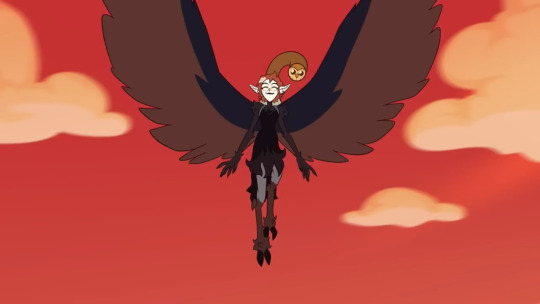
Lilith accepted that she wasn’t an inferior sister, and finally got recognized for what she could do.
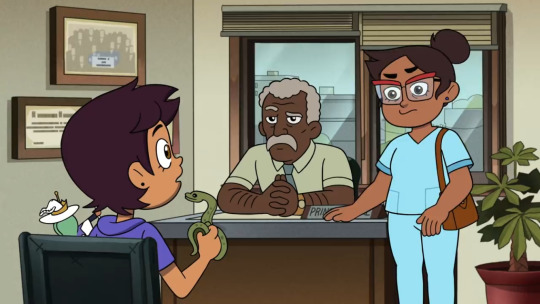

Camila realized the way she was treated was wrong, and by loving her daughter, she got to love herself.

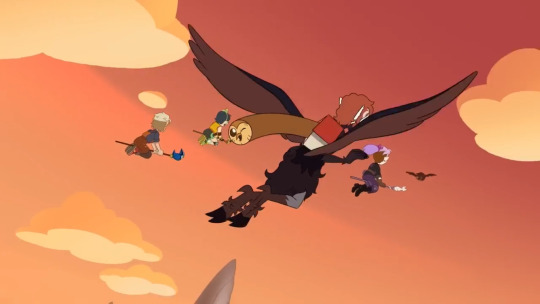
Hooty was a misfit among misfits, but was finally valued by the rest, and got another misfit as a friend.
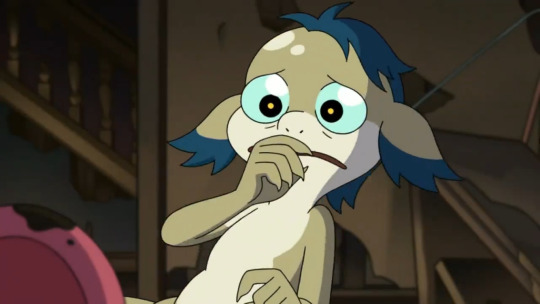
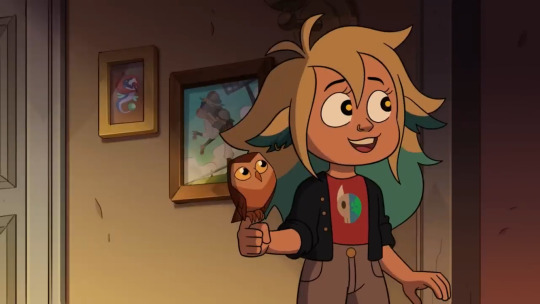
Vee recovered from her trauma and didn't have to hide who she was, finding her own face without having to copy others.
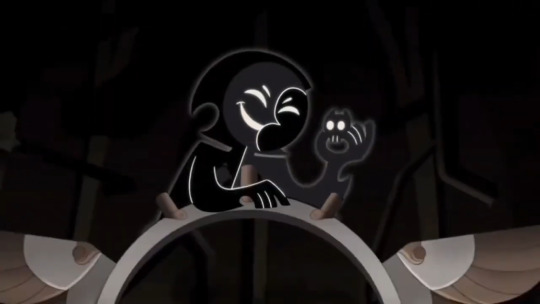

The Collector learned they couldn't force friendship from others, and gained a better understanding of life.
#the owl house#lilith clawthorne#camila noceda#the owl house hooty#vee noceda#the owl house collector#character development
22K notes
·
View notes
Text
Prompt 2482
The doctor in town seems to be the only person immune to the plague.
#daily writing prompts#fiction#writing#writing prompts#writing practice#writing inspiration#prompt#creative writing#character development#words
51 notes
·
View notes
Note
How difficult is it to make your OC laugh? And is there anything that would be guaranteed to make them laugh?
.
44 notes
·
View notes
Text
Writing Character CHANGE
Character development is absolutely CRUCIAL to a story, but having spent more time thinking about this topic, I came to the realization that I misunderstood a lot of points other people have made when teaching how to write character development.
There are a lot of factors that play into character development, but in this post, I'll cover some overall, but the main thing concerns any change to your character! (Which is also a huge part in development, really.)
So with this post, I'll be teaching you MY personal tips regarding this subject!
*The Basics*
Before we really get into the developmental stage, there are some things you want to establish, in which I'll explain later!
A couple of flaws.
How your character views themselves at first.
Your character's morals/ideals and how they think.
These things may vary, but you want your readers to be able to at least roughly predict how your character will act during specific events!
*Change*
Character development is just about how your character changes throughout the story. I like to say that there are several different ways one may change, (we'll get into that later on) but your character should NOT stay the same as the same person during the exposition and during the resolution!
"During character development, your character should grow."
This is a common piece of advice; your character needs to grow. And while I've assumed for the longest time that I understood what it meant, it never truly clicked.
While they will use words such as grow, what they really mean is that your character should mature. By the end of your story, your character may not always end up as a better person. When I say mature, I mean that they have reflected back on their life and have understood the consequences that came with their actions (if any) or how they could've done things differently.
Your character will not always end up as a better, fixed person, but they should understand their world and themselves better.
*Negative/Passive Change*
Alright then, so how does a character develop if they don't necessarily change for the better? Well, I'll get into that!
No matter what, your character should have learned a lesson through their experience. Even if they haven't exactly improved as a person, there should be a moral they can learn from what they have gone through.
If not, then did they really grow?
Additionally, how did their qualities negatively impact themselves? If they are bad traits, then it needs to be clear. And the best way to achieve this is by demonstrating how it hurts your character! However, it is rather uncommon for a character to undergo little to no change after a story!
*Positive Change*
Let's circle back to the basics, real quick. Remember how I said that before any development takes place, your character should be anything but perfect? That same thing applies to after the change.
Do NOT create a flawless character by the end of your story. Instead, focus on one or two flaws that get fixed as the story continues. These don't have to be huge, life-changing imperfections, but they can be minor ones that still shape their life in one way or another.
"Fixing" too many shortcomings can make your character seem, well, out of character, producing a character development that's more forced. The same thing applies if you're attempting to FULLY alter a fault that's just too big. The change will be too noticeable.
What am I talking about? Here's an example!
Imagine a character who's incredibly closed off to other people, wanting to ensure that he never gets too close to others.
That's a pretty sizable flaw, no? By the end of your story, you do not want to completely change because you need to preserve character, but you can change it a bit. Does he have a few friends now? Does he understand that there are some people worth trusting?
He may still be closed off to majority of people, but at least it's not everyone, and that's a realistic change.
*Different Changes*
As I continue to read more stories and watch more shows, I have realized that character development is not always about fixing flaws or personality, but it can extend far past that line.
So listen up, because I feel like no one really talks about this.
Your character can change their IDEALS, MORALS, and how they VIEW THEMSELVES.
Hear that? If your character has strong morals, they will hardly stay the same as they reach the end. Remember the requirements I mentioned at the beginning?
See how it connects now? There is SO much more to character development than changing a few imperfections. Like I said in the start, your character needs to grow and mature. Things like new morals or ideals assist with that!
*SUMMARY*
In order to start character development, you need a couple of flaws, an idea of how your character looks at themselves, and their morals. This is because those are the main parts of you character that may change through time.
Growth = Maturing (gaining a better sense of who they are and the world they live in.)
NOT ALL CHARACTER DEVELOPMENT IS POSITIVE!
For negative or passive change, make sure to clarify how their imperfections affected or hurt them and have some sort of moral that follows.
YOUR CHARACTER SHOULD NOT BE PERFECT!
They should not be perfect in the beginning, and not perfect in the end! Do not 'fix' too many traits because you want to preserve character.
I think that's all! It's quite the post for something so simple, eh? But hey, character development is absolutely PIVOTAL to a story so I hope I at least explained the 'change' part of that well!
Happy writing~
3hks <3
#writing#writeblr#writerscommunity#writing tips#creative writing#writing inspo#writing advice#character writing#writing characters development#character development#character change#writing characters change#character building#tips on character development#tips on character building#advice on character building#advice on character development
1K notes
·
View notes